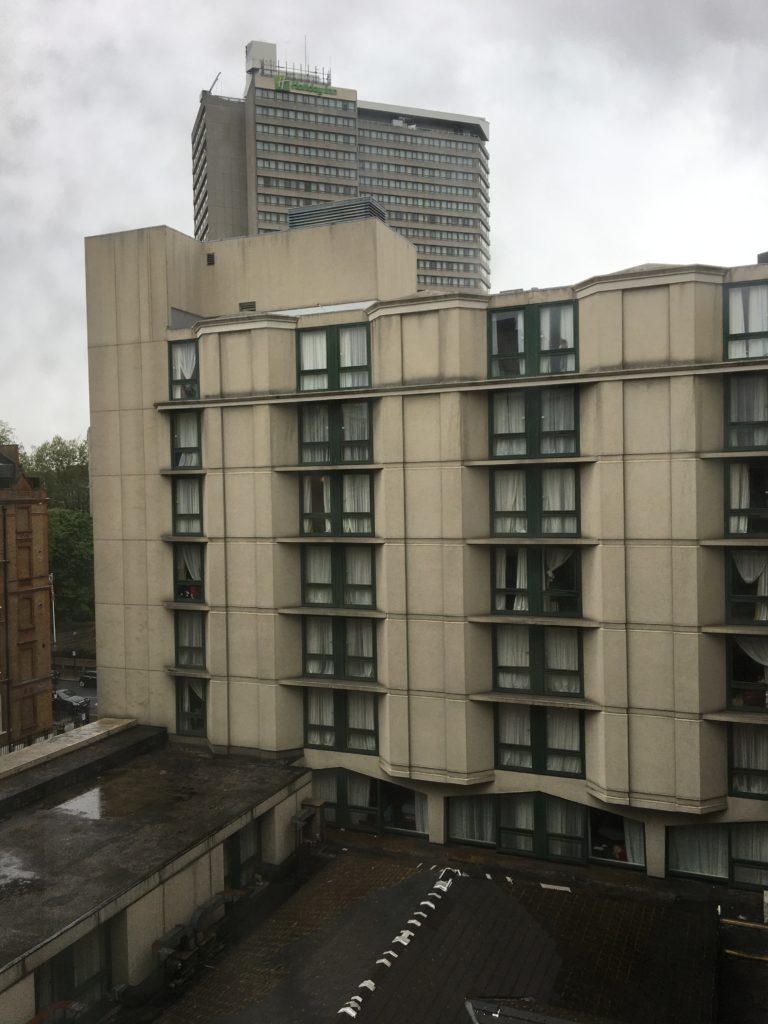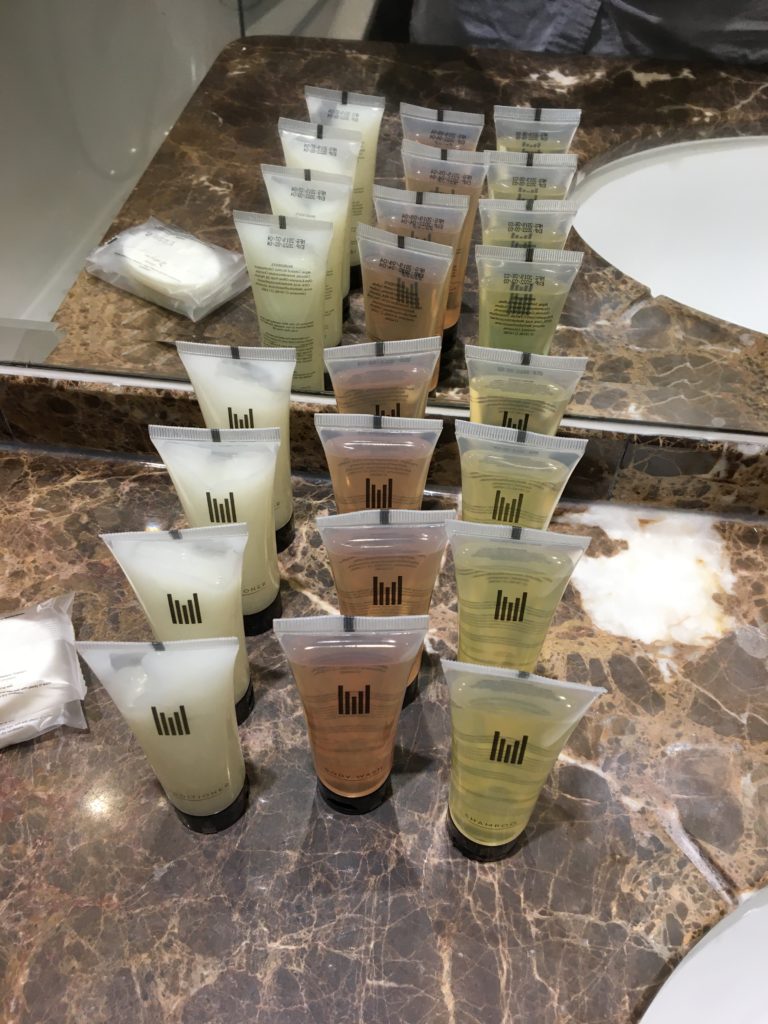Tim Dee, on his first return to Britain in fourteen months, is in mandatory ten-day quarantine in a former casino-hotel in south-west London. He won’t be allowed out until the end of next week. He arrived yesterday from South Africa, a UK GOV red list country on account of its COVID-19 variant. He’d been living, just north of the Cape of Good Hope, for an unexpectedly long time thanks mostly to the world-wide events of the last eighteen months but also to the very local birth and first year-plus of one young Adam.
He has offered to keep a diary of his stay for CBTR. All this week, and perhaps into next too, he’ll be tapping a message on the water pipes in his room or recruiting a London pigeon to fly out a microfiche. We’ve transcribed his news.

Tim Dee’s view for the next ten days
Sunday 16th May
It became harder to stay put than to come. I decided I couldn’t wait any longer. After my ten days locked up in London, I hope to head west to Somerset to see my mother for the first time since her husband, my dad, died in March 2020. That is what I have said to her and to myself and to the rest of my family and it is true, but I also wanted to inhale at least the closing green shuffle of an English spring, the season that I totally missed last year and that I haven’t lived through for any one day since I wrote Greenery which is all about how good it is to do just that. My mother lives on as a heroic widow in Minehead in west Somerset. Nearby are the life-giving oak woods of the Quantocks and northern Exmoor, home – spring home – to my favourite trinity of small migrant birds that swap sub-Saharan Africa in their winters for the temperate rainforests at Horner and Tannery woods and elsewhere in their and our (I want to say) spring. I hope I will see all three when I get free: I’ve written out their names and their places in my new room tonight which floats, as it seems, nowhere, and it makes a prayer – pied flycatcher, redstart, wood warbler. There are fire escape instructions written on the back of my door here; I think of those too, and of the cod-olde Go Placidly posters you used to see pinned up in the houses of people who were not quite but almost like you.
I won’t write about the birds again (I might already have written about them too much). All that lies ahead, I hope, and it is why I am here on my first day back in Britain, on an overcast and puddled London Sunday evening. My fifth-floor window view is almost entirely concrete and grey, the day has been the same. Grim for any May day. In the only gap between the opposite piss-coloured concrete wing of the hotel and a red brick Victorian tenement block there is a damp shine of green, a bit of a park with trees in wet leaf that will need binoculars (unpacked as yet) to identify. If I was a guest, I could of course have stepped out between the last sentence and this and walked the block to the little green plot. But I am not, despite what the welcome pack tells us, and there aren’t any guests here at all: in the windows opposite mine I can see people, two I recognise as having taken the same flights as I did from Cape Town to London via Frankfurt. Across the grey in-between air, I can see their mouths and smiles now as I hadn’t before – we were all masked up, and enjoined to be so, as we travelled, and as we queued to be allowed to travel, up the length of our habitable planet. Three people right now are taking pictures or filming as they talk on their phones.
I’ve already done the same. This! This is what quarantine looks like. As the days go on, there will surely be more to describe and to say about it all, though everything is now in front of me, the view that will be all that I have. And already for ages, as my uncle’s mother used to say, I’ve been sat here, like a mutt, staring at these four walls.

All the unguents for a quarantine
On the plane from Cape Town, I sat nearer a stranger than I have in more than a year. A similar age to me, he was a South African jazz bassist returning to his home in Britain having visited his elderly mother near Cape Town. We swapped intercontinental mother stories for a bit and then went on to the jazz merits of some of the noisier birds that have got more common in the Cape area since he left in the early 1980s. I told him that I can hear Albert Ayler in the cracked honk of a hadeda ibis; he laughed at that but said he preferred the muzzy vibe given up by agitated Egyptian geese. He spoke of Dollar Brand (Abdullah Ibrahim) too, who I loved once very much, and also the Brotherhood of Breath and jazz’s contribution to the years of the struggle against apartheid. Chris McGregor’s band’s name leapt out between us but after that our talk wound down, we adjusted our masks, and got on with our thoughts and managing our cabined and confined legs and feet. Not doing well at that, I woke in the middle of the night and watched Singing in the Rain (about the coming of the talkies) somewhere over the Sahara. It was my father’s favourite film. It had been thick with autumn rain in Cape Town when I left, and it was to be thin with it too in the London spring when I arrived.
The free world means something different to me as of today now that it isn’t. How quickly I acquiesced in the losing of my rights. Getting here involved a lot of what the poet Ken Smith used to call Hurry-Up-and-Wait time. I showed my Passenger Locater Form on a dozen occasions but where truly was I? People took it and my passport from my hands and my bags from my side and then ordered me around, first here and then there. A woman, one of us, cried in the freezing wind-tunnel that welcomes no one outside the terminal at Heathrow: we’d been left to stand out in the weather awaiting our transports. Our detail of minders – young men in hi-viz jackets and blue safety gloves – stood about, avoiding our eyes while knowing the angles to stand among the concrete planes where the wind didn’t sheer and blow quite so cruelly. We sat on the coach that delivered us red triangle people (the red zone quarantine sign) to our lagers and I looked out, feeling like a fresh-hooked fish still trying to catch its breath – I wanted to say that I’d been on those pavements, and I knew them as anyone on them now did, and that I wasn’t a coelacanth. My next grief was a sense of being looked at as I – wickedly – once in Bristol looked at a section from an offender/community repayment scheme where some bad boys were made to pick up litter while wearing abject tabards announcing their captivity to the rest of the world that they might once naively thought they belonged to. I wouldn’t say it was like a yellow star forced on the Jews of World War Two, but I thought of them too. I had already done that earlier, as well, in one of the airport queues at Heathrow when, having failed to join the right line and being sent to the back of another, I found myself the queuing neighbour of a shouted interrogation of ten young Turkish-speaking men, all with small rucksacks and wearing cheap trainers and dirty puffer jackets. None of them spoke English and the Border Staff officer, one hand on his handcuffs at his hip, repeated himself: Why, why did you come here, why today have you come here? There are softish benches in that section of the Border zone and the young men sat on them as if their very sitting on such softness was wrong.
A cruel thing is that in my cell this first day has to be done but isn’t counted: it is Day Zero officially, the tally only begins tomorrow. You are already nought, and it amounts to nothing. They feed us though, at times advertised brown paper bags appear at our doors, with the items supplied that we have ticked on a crude menu. They tap to let us know and we can open up and salute the meal at our feet. After only a few hours it already is feeling somewhat illicit to open the door. A guard sits on every corridor. My cilice masala with a naan was the best thing that happened to me here today.
Tonight, I’ve been able to hear little Adam humming to his soft animal toys back in Cape Town and then I dialled up and listened to Brotherhood of Breath and Dollar Brand’s Live in Montreux and was restored to the hadedas I heard at dusk just earlier this week in the Cederberg of South Africa, and their honks giving way to a silent bat that stuttered around our braai, before a Cape eagle owl’s high moan put a different soul music into the night. Outside the London window on Day Zero I saw just one bird, a herring gull flying over. The wildtrack is traffic slush. After a year away from that, it too has a music.
*
More from Tim (@timdee4) tomorrow.